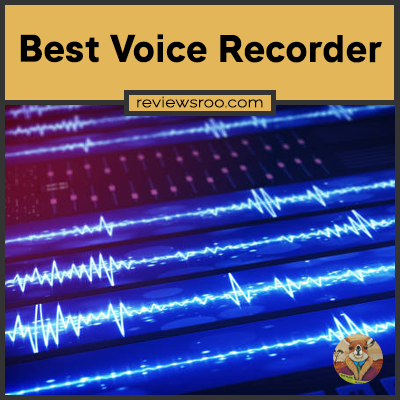Best Voice Recorder
In this day and age, voice recordings are essential tools in many professions. In fact, recent studies have shown that over ninety-five percent of all business communications are done through voice recordings. With so much riding on these recordings, it’s important to get the best one available. This article will explore the best voice recorders out there and how they can help you make sure your communications are heard loud and clear.

For those who need a reliable recorder to capture their business meetings or client interactions, the best choice is undoubtedly a digital recorder. Digital recorders offer superior sound quality and can store numerous hours of audio without taking up much space. Plus, with features like noise cancellation technology, you won’t have to worry about background noises interfering with your recording session.
Finally, if you’re looking for a more affordable option that still provides excellent sound quality, analog recorders could be the way to go. These devices may not have all the bells and whistles of digital recorders but they still provide great sound for your recordings. Plus, analog recorders tend to be more user-friendly than their digital counterparts since they don’t require as much technical knowledge to operate them.
So whether you’re looking for superior sound quality or just want something easy to use, there’s a voice recorder out there that can meet your needs. Keep reading to find out which one is right for you!
What To Look For In A Voice Recorder
When looking for a voice recorder, there are several key factors to consider. First, consider the type of recording you need: is it a low-fidelity recording or something more professional? Will you be using the device to record conversations, music, or something else? Knowing what kind of audio you need will help narrow down your search.
Next, look for features like battery life and storage capacity. Voice recorders can be limited in battery life if used frequently; make sure you choose one with enough power to last as long as you need it to. It’s also important to find a device that offers enough storage space for your recordings. Durability should also play a role in your decision; look for recorders made from sturdy materials that won’t break or wear out easily.
These considerations will help ensure that your voice recorder is well-suited to your needs and will provide good quality recordings over time. Moving forward, it’s time to think about the different types of voice recorders available on the market today.
Types Of Voice Recorders
Voice recorders come in all shapes and sizes, from expensive professional models to cheap consumer devices. Imagine a sound studio filled with mics of various types, from tiny lavalier mics to large condenser microphones. Each type has its own unique features and capabilities, so let’s take a look at some of the most common types.
Dynamic mics are best for recording loud sources such as drums or vocals. They’re rugged and inexpensive, making them ideal for live performances or home studios. Condenser mics are known for their high sensitivity, making them great for capturing subtle nuances in acoustic instruments or vocals. They’re also perfect for picking up sound from a distance, making them great for recording lectures or interviews. Portable digital recorders are small enough to fit in your pocket and offer great convenience when you need to capture quick ideas on the go. Finally, multi-track recorders allow you to record multiple tracks simultaneously, giving you more control over the final mix.
Benefits Of Using A Voice Recorder
Voice recorders are becoming increasingly popular, with almost eight million sold in 2019 alone. The benefits of using a voice recorder are vast and can significantly improve the user’s life.
To begin with, voice recorders can be used to capture important information quickly and efficiently. Whether it is a business meeting or an academic lecture, recording conversations is far easier than having to take notes manually. Moreover, they also help boost productivity by saving time that would otherwise have been wasted on transcribing audio recordings or writing out notes.
Furthermore, voice recorders are also great for preserving memories. They allow users to capture precious moments that might have otherwise been forgotten or lost forever. Additionally, they provide a convenient way to relive important events or conversations without having to re-listen to entire audio recordings.
Voice recorders offer many advantages and can make life much easier for those who use them regularly. With the right features, these devices can be invaluable tools for both work and leisure activities.
Features Of Quality Voice Recorders
Voice recorders are a must-have tool for anyone looking to capture audio. To ensure you get the best results, however, it’s important to understand what makes a quality voice recorder. Let’s take an in-depth look at the features of a great device.
Ambitious wordsmiths may be tempted to grab any old voice recorder and hope for the best, but that could be a costly mistake. Instead, let’s explore some of the essential features that make such devices stand out from the crowd.
One of the most sought-after characteristics is high-quality recording capabilities. Look for options with multiple microphones that can pick up sound from different directions and have settings for different environments. You’ll also want to prioritize recorders with reliable noise reduction technology so that your recordings will be crisp and clear even in noisy environments. A long battery life is also essential – you don’t want to find yourself stuck without power halfway through an important meeting! And finally, look for something with an intuitive user interface so that you can quickly access all your settings without fumbling around trying to figure out how it works.
A good quality voice recorder should come with all these features, making it easy to capture audio without any hassles or headaches. Next up: we’ll take a look at some of the best voice recorders on the market today.
Best Voice Recorders On The Market
Amazingly, the market is teeming with innumerable voice recorders that can be overwhelming to choose from. But don’t worry! Here’s a list of some of the best voice recorders out there that will make your life easier.
First off, for great sound quality and portability, the Zoom H4N Pro is an excellent choice. It has two XLR/TRS combo inputs and four-track simultaneous recording, making it perfect for podcasts, audio for video shoots and workshops. Then there’s the Roland R-07 High Resolution Audio Recorder which has a lot of features like automatic level adjustment and phantom power, making it ideal for musicians and engineers on the go.
For those looking for something small but powerful, the TASCAM DR-05X Stereo Portable Digital Audio Recorder is perfect as it fits in your pocket but can still capture audio up to 24-bit/96kHz resolution. And if you’re looking for something to take your music production up a notch then you can’t go wrong with the Sony PCM-D100 Hi-Res Linear PCM Recorder which records up to 192kHz/24 bit resolution and comes with built-in stereo microphones.
Whatever you choose, don’t forget to consider all of your options before settling on one recorder. Doing so will ensure that you get exactly what you need!
Tips For Choosing The Best Voice Recorder
Choosing the best voice recorder isn’t easy. It’s important to understand what features are most important and how to narrow down your options. We’ll look at some tips for choosing the ideal voice recorder.
To start, consider what type of recording you need – analog or digital. Analog recorders will be cheaper but will give you less control over sound quality and may not have as many features as a digital one. Additionally, think about battery life. Digital recorders tend to have longer battery life than their analog counterparts, so if you plan on using it for long recordings, this is an important factor to consider. Think about storage space too; some digital recorders offer more storage capacity than others and can come with SD cards or USB drives for even more space.
Finally, determine what other features you need in a voice recorder such as external microphones, headphone ports, or line-in/line-out ports for connecting to other devices. With all this information in mind, you’ll be able to find the perfect voice recorder that meets all your needs and budget.
Advantages Of Digital Voice Recorders
“A stitch in time saves nine” — a wise adage that reminds us of the importance of investing in quality and long-term solutions. Investing in a digital voice recorder is one such solution, offering multiple advantages.
For starters, digital voice recorders are compact and lightweight, making them easy to transport. They also have long battery lives, meaning they require fewer charges throughout the day. Plus, digital recorders can store far more data than their analog counterparts, allowing for longer recording sessions without interruption.
The sound quality offered by digital recorders is superior to analog devices too – recordings are crystal clear with very little noise interference. Digital recorders also come with features like automatic gain control (AGC) which can help reduce background noise and improve clarity even further. All this makes digital voice recorders an ideal choice for those looking for high-quality recordings.
The transition into the next section about ‘disadvantages of digital voice recorders’ is natural here — such devices do come with some drawbacks that users should be aware of before making their purchase decision.
Disadvantages Of Digital Voice Recorders
Digital voice recorders seem like a great invention—that is, until you actually use one. All that convenience and affordability comes with some major drawbacks.
For starters, digital recorders are prone to all sorts of problems related to sound quality. Audio artifacts like pops, clicks, and crackles can be incredibly distracting and may even render the recording unusable. Plus, digitizing audio can produce a noticeable loss of fidelity; the more times it’s converted, the worse it sounds. And don’t forget about distortion if you’re recording at too high of a volume!
These issues can be avoided with proper care and attention when setting up and using your digital recorder—in other words, knowing what you’re doing helps a lot. That said, these devices can still provide good results if used correctly.
Tips For Optimizing Voice Recording Quality
Voice recording can be an art form. It’s not just about pushing a button and capturing sound. To get the best quality recordings, one must pay attention to details. So what are the tips for optimizing voice recording quality?
To achieve maximum clarity and fidelity in your recordings, there are various steps to observe. For starters, find a quiet environment away from any background noise or distractions that could interfere with your recording. Ensure you use the correct microphone for your task and always check that it is working properly before beginning. Set up the microphone correctly with respect to distance from the sound source and angle of pickup. Then adjust the gain control for optimal levels on your recorder as required.
These simple steps will help you get started on optimizing voice recording quality but there’s more to consider for a professional-level result such as acoustic treatment of your environment, careful attention to audio editing techniques, and more. Taking these actions will ensure that you capture high-quality audio recordings every time you hit the record button. Now let’s move on to troubleshooting common voice recording problems…
Troubleshooting Common Voice Recording Problems
Troubleshooting voice recordings can be like navigating a minefield: one wrong step and the whole thing is ruined. But taking the time to address any issues that may arise in the process can help to ensure that you get the best quality recording possible.
From poor sound quality to technical glitches, there are plenty of things that can go wrong when it comes to capturing audio. Check your equipment regularly—from wiring and connections to batteries—to make sure everything is in good working order before you record. If you’re using a computer, make sure your sound card is updated and configured correctly, too. And lastly, if possible try and record in an environment with minimal background noise; this will result in a much cleaner signal when all’s said and done.
It’s also important to take regular breaks while recording, as this helps promote clarity of thought and articulation. Taking a few minutes away from the mic every now and again gives you time to clear your head and refocus on what you’re trying to achieve with your audio capture. With some effort and dedication, you’ll be able to overcome any challenges that present themselves during the recording process – so don’t give up!
Frequently Asked Questions
What Are The Differences Between Digital And Analog Voice Recorders?
Voice recorders come in two distinct varieties, digital and analog. But what’s the difference? While both have their advantages, it’s important to understand the nuances between them.
Digital recorders offer more portability and convenience. The sound quality is generally superior, as digital recordings don’t suffer from the same signal degradation that analog can. The recording process itself is easier too, as there’s no need for bulky equipment or complex settings. And with a digital recorder, you get instant playback and volume control capabilities.
Analog recorders may be bulkier than their digital counterparts but they do offer advantages of their own. Analog recordings are typically considered to have a warmer sound than digital recordings. There’s also less noise distortion associated with analog recording; this means you can capture very faint sounds that would otherwise not be picked up by a digital device. Additionally, there are usually fewer software issues with an analog recorder compared to a digital one, making it simpler to use overall.
So when deciding which voice recorder is best for you, it pays to weigh up these differences carefully – digital recorders offer convenience and clarity while analog devices offer warmth and accuracy – before making your choice.
How Much Should I Expect To Spend On A Quality Voice Recorder?
Voice recorders can be found in a range of prices. It’s important to consider the quality and features you need when buying one.
Digital voice recorders offer more features, like the ability to store data, than analog models. But they cost more too. Generally, digital models start around $50 USD and can go up to $500 USD or more for professional-grade models.
Analog voice recorders are often simpler and less expensive than digital ones. They may not have as many features, but that makes them easier to use. Prices for analog models start at about $25 USD for basic models and go up to about $200 USD for those with more advanced features.
What Are The Best Ways To Store And Back Up My Recordings?
Storing and backing up recordings is a crucial part of the recording process, one that can make or break success. It’s like an insurance policy for your audio. So it pays to know which are the best ways to keep your recordings safe.
The most important thing is to have redundant storage options. That way if something happens to one copy, you’ve got another. For example, you could store your audio both on an external hard drive and in the cloud. Cloud storage also has the advantage of being easily accessible from any device with an internet connection, allowing you to quickly share recordings with other people without having to plug in a drive or send files via email.
Every recording should be documented carefully and backed up regularly, making sure that nothing is ever lost or deleted accidentally. One way to do this is by keeping both a digital version and a physical copy of the audio. Additionally, it’s always wise to create additional copies just in case anything goes wrong with your primary storage system. Doing so will ensure that all your precious work remains safe and sound no matter what happens.
Are There Any Additional Accessories I Should Consider Purchasing With My Voice Recorder?
Some voice recorders come with all the accessories you need, but others may require additional purchases. It’s worth considering what else you might want to get. Microphones can be a great addition if your recorder doesn’t have one built in, or if you need a better quality one. You may also want to buy a tripod stand, which can be useful for recording lectures or interviews.
External storage devices are another important accessory. This will give you extra space to store your recordings, and can help protect them from accidentally being deleted. Headphones are also helpful for monitoring sound quality during recording sessions. So it’s worth checking what accessories are compatible with your recorder before making any additional purchases.
Are There Any Special Considerations For Recording In Noisy Environments?
Recording in noisy environments can be a tricky endeavor; one must consider several things to ensure the best results. Firstly, it is important to understand the environment and plan accordingly. Utilizing a device that has noise cancellation capabilities is essential for capturing audio without any background distortion. Additionally, technological advancements in software have allowed for greater control over audio recordings, such as noise reduction and equalization.
Consequently, soundproofing or confining the environment may also be necessary when attempting to record in loud locations. Investing in materials like acoustic foam or blankets can help to dampen the sound and reduce unwanted reverberations. Furthermore, proper placement of the microphone is key; ideally it should be close enough to pick up the desired source but far enough away that it doesn’t capture too much background noise.
By taking these extra steps into account one can improve their chances of producing quality recordings even in noisy environments. With the right preparation and equipment anyone can make sure their audio comes through clearly without interference from outside sources.
Conclusion
Voice recorders are a great way to capture and preserve memories, whether it be conversations, lectures or interviews. They’re also becoming increasingly popular for musicians who want to capture their ideas when inspiration strikes. With the right recorder, you can record high-quality audio in any environment.
The cost of digital recorders can range from the very economical to the very expensive. You should always consider what your needs and budget are before making a purchase. According to one survey, 89% of people said they felt more confident about their purchases after researching online reviews.
No matter which recorder you choose, there are some important accessories that you should consider purchasing with it. These include extra memory cards for storing recordings, microphones for capturing sound in noisy environments and other items that will help ensure your recordings come out as clear as possible.
In conclusion, voice recorders are an invaluable tool for recording memories, conversations and musical ideas with ease. With the right research and accessories, you can create stunningly clear recordings every time – allowing you to keep those special moments alive forever.





